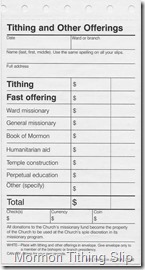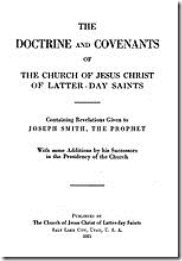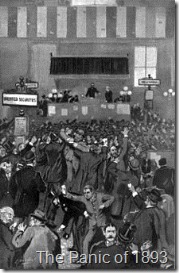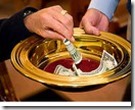“The law of tithing is one of the most important
ever revealed to man. . . . Through obeying
this law the blessings of prosperity and
success will be given to the Saints.”
Lorenzo Snow
A Revelation
It was in early May 1899, we are told, that president Lorenzo Snow ‘felt prompted to visit the city of St. George and other settlements in southern Utah.’ The president, the story continues, on arriving in St George, received a clear revelation in which the saints were urged to obey the law of tithing:
“The word of the Lord to you is not anything new; it is simply this: The time has now come for every Latter-day Saint, who calculates to be prepared for the future and to hold his feet strong upon a proper foundation, to do the will of the Lord and to pay his tithing in full. That is the word
of the Lord to you, and it will be the word of the Lord to every settlement throughout the land of Zion.”
Snow described this experience, “I never had a more perfect revelation,” he later said, “than [the revelation] I received on this subject of tithing.”
We are further informed, “On July 2, all the General Authorities and representatives from all the stakes and wards in the Church attended a solemn assembly in the Salt Lake Temple, having fasted and prayed in preparation for the meeting. There they unanimously accepted the same resolution [to accept this revelation on tithing].”
Mormonism is founded on the doctrine of continuing revelation and an open canon of Scripture. Why did this revelation not make its way into the Doctrine and Covenants (D&C)?
 There are many such instances when claims to have received revelation are not followed by any additions to the increasingly inappropriately described Mormon “open canon.”
There are many such instances when claims to have received revelation are not followed by any additions to the increasingly inappropriately described Mormon “open canon.”
On one hand Mormons insist their leaders are prophets and what they say “officially” is binding, on the other hand, when those prophets are quoted – as I am quoting Lorenzo Snow here – Mormons will insist the only truly binding teaching is that contained in the “Standard Works” of the Mormon Church; the Bible, Book of Mormon, D&C and Pearl of Great Price.
Is this word binding if it isn’t between the bindings of official doctrine? This is a troubling issue for both Mormons and those who question Mormon claims. You can read more about it in The Mormon Chapbook
Historical Context
Some historical context will shed light on these developments in Mormon history. In their book, The Mormon Experience, A History of the Latter-day Saints, Leonard J Arrington, (Mormon Church Historian 1972-1982) and Davis Bitton (Assistant Church Historian, 1972-1982) wrote:
“The financial condition of the church throughout the 1890s was desperate. Contributions had dwindled to a trickle due to hard times and fear that donations would end up with the federal government. When escheated church properties (properties that had reverted to the government) were finally returned after statehood, their value had been substantially reduced by mismanagement and the sale of several revenue producing properties. The prolonged depression of the 1890s cut income from church-supported industry, while calls for welfare expenditure increased.
The completion of the four-million-dollar Salt Lake Temple also helped to deplete the church’s resources. The seriousness of of the situation at the end of 1896 was described in a journal entry by Wilford Woodruff: ‘The presidency of the church are so overwhelmed in financial matters it seems as though we shall never live to get through with it unless the Lord opens the way in a marvellous manner. It looks as though we shall never pay our debts.”’”
In response to Mormon intransigence with regard polygamy the Edmunds-Tucker Act, 1887, allowed the government to effectively dissolve the Mormon Church as a legal entity and required the church to forfeit to the government all property in excess of fifty thousand dollars.
The dire financial straits of the church were the direct consequence of a leadership that thought itself above the law in respect to polygamy. It was this that forced the hand of church president Wilford Woodruff, in 1890, to issue the Manifesto abandoning polygamy, and the Manifesto that led to the return to the church of seriously mismanaged and depleted properties.
The church was on the brink of bankruptcy and the leaders who got Mormons into these shocking circumstances were now insisting Mormons had a duty to get themselves out of it.
The United States was already in the grip of a huge depression, begun in 1893, in which hundreds of banks closed and thousands of businesses went under. The unemployment rate in Pennsylvania hit 25%, in New York 35%, and in Michigan 43%. Soup kitchens were opened to feed the destitute and some women, it is reported, turned to prostitution to feed their children.
For Mormons, added to this was the burden of church property being confiscated and tithes drying up for fear the little the saints were able to give might end up in the coffers of the federal government.
The church’s 1898 deficit of $1.25m became a net worth of $3.2m by 1904 and, while church leaders ascribed the changing fortunes of the church to God’s blessing tithe payers, it may have had more to do with the saints gaining full statehood and involvement in the rapid growth of the US economy from 1897 to 1907. Of course, the eyes of faith would have it otherwise, with the fortunes of the United States tied in with the fortunes of Mormons.
Tithing
I want to pick up on three Lorenzo Snow quotes from the book:
“If we will keep that law . . . the land will be sanctified, and we shall be counted worthy to receive the blessings of the Lord and to be sustained and supported in our financial affairs and in everything we do, temporal as well as spiritual.”
“Here is a law revealed specially for our protection and safety, as well as for our advancement in the path of righteousness and holiness; a law by which the land on which we dwell might become sanctified; a law by which Zion might be built up and established never more to be thrown down or removed out of her place by wicked and ungodly men.”
“The temporal salvation of this Church . . . depends upon obedience to this law.”
The above quotes chime with everything written in the Old Testament regarding tithing. It is a law that must be obeyed by the people of God, obedience to which will bring temporal blessing in the land to a specific people group. The problem is it isn’t binding on Christians under the New Covenant (Testament means Covenant)
Tithing didn’t originate with the Mosaic Law. Nor was it peculiar to the Hebrews but was widely practiced among ancient peoples and civilisations. When Abraham paid a tithe to Melchizedek, king of Salem, it was not in obedience to a specific command from God. It was a tithe of the spoils of war, a voluntary act of devotion to God in thanks for the rescue of his nephew Lot (Gen.14: 17-20, c.f. 28:20-22, Jacob does something similar)
Lets take a quick tour through the requirements of the Old Covenant (Testament) regarding tithing and its purpose.
Tithing in the Old Testament
The tithe was of the land, its seed and fruit, and of animals and it related to service in the sanctuary. Given its nature it was almost certainly paid annually. Every year after the land had been harvested, the people would bring to the priests the tithe of their harvest and increase in herds and flocks – Lev.27:30-33
Tithes were given to support the Levites. Because the Levites had no inheritance in the land of Canaan, like the other tribes, God provided for their support through the tithes of the rest of Israel – Numbers 18:21-24
There was a second tithe to provide for the religious feasts and festivals of Israel – Deuteronomy 14:22-27
Every three years the people of the town were to bring a tithe of their crops and herds and gather them together to take care of the poor of their towns including the alien, orphan and widow. There is debate over whether this is a third tithe or the second tithe put to a different use – Deuteronomy 14:28-29
These tithes were lawfully required and not voluntary – Nehemiah 12:44
Malachi 3:8-12 – This is the familiar text used by Mormon to justify their quid pro quo approach to tithing. Lets see what it actually says:
You are cursed with a curse, for you are robbing Me, the whole nation of you! Bring the whole tithe into the storehouse, so that there may be food in My house, and test Me now in this, says the Lord of hosts, if I will not open for you the windows of heaven, and pour out for you a blessing until it overflows. Then I will rebuke the devourer for you, so that it may not destroy the fruits of the ground; nor will your vine in the field cast its grapes, says the Lord of hosts. And all the nations will call you blessed, for you shall be a delightful land, says the Lord of hosts.”
Tithes are the annual, or triennial first fruits of crops and animals. Offerings are the grain and animal sacrifices brought to the temples. If we are to tithe are we to make animal sacrifices? The curse for disobedience was a curse on crops, fields and stock, the very things in which they had sinned in not tithing, “…because you would not obey the Lord your God by keeping His commandments and His statutes which He commanded you” (Deut. 28:18, 23-24, 38-40, 45)
The “storehouses” referred to were chambers in the temple set apart and designated to hold the tithes of the people for the support of the priests (Nehemiah 12:44) It is these  that would be filled until they overflowed when Israel obeyed. The “pests” (devourer AV) who would not destroy their crops was the locust (Deut.28:38) Israel’s obedience would result in abundant crops, rain and increase in herds and flocks. Tithe barns can still be seen around Europe. The one on the left is in Great Coxwell, Oxfordshire, England. We are no longer under that system but this is the system prescribed by Mormonism.
that would be filled until they overflowed when Israel obeyed. The “pests” (devourer AV) who would not destroy their crops was the locust (Deut.28:38) Israel’s obedience would result in abundant crops, rain and increase in herds and flocks. Tithe barns can still be seen around Europe. The one on the left is in Great Coxwell, Oxfordshire, England. We are no longer under that system but this is the system prescribed by Mormonism.
I mentioned a quid pro quo approach for Mormons. Mormonism teaches that our obedience binds God to bless us, “I, the Lord, am bound when ye do what I say; but when ye do not what I say, ye have no promise.” (D&C 82:10)
This is the lens through which they view the law of tithing: If you obey you are bound to prosper. You will sometimes hear Mormons insist that, “Those who leave the church never prosper,” and this it is that stands behind their salvation by works. The Mormon message is a message of “progression” not salvation, and that progression depends not on the finished work of Christ at Calvary but on their strict obedience to the Mormon Plan of Salvation, including the law of tithing.
Giving in the New Testament
There are only four New Testament passages in which tithing is mentioned:
(Matthew 23:23, c.f. Luke 11:42) This text is talking about tithing herbs under the Old Covenant. The New Covenant was not yet inaugurated until Jesus’ death (Lk.22.20; Heb. 7:12)
Luke 18:12: This is the parable about the Pharisee and the tax-collector. The words, “I pay tithes of all that I get,” are put into the mouth of the self-righteous Pharisee who thinks himself justified before God on the basis of his works. Some people are in Scripture as examples, others as warnings. Is this Old Covenant warning our example for Christians living under the New Covenant!
Hebrews 7:1-10 This passage is not about tithing but about the superiority of the priesthood of Christ over the Levitical priesthood, even as Melchizedek was superior to Levi who, being in the loins of Abraham, paid tithes to the priest/king. Even so, the New Covenant is superior to the Old.
So how is giving understood under the New Covenant?
There is no percentage prescribed but, like Abraham and Jacob, Christians are to give voluntarily, “just as he has purposed in his heart; not grudgingly or under compulsion; for God loves a cheerful giver” (2 Cor. 9:7).
1 Corinthians 16:1-2: “Now concerning the collection for the saints, as I directed the churches of Galatia, so do you also. On the first day of every week let each one of you put aside and save, as he may prosper, that no collections be made when I come.”
Here saints are urged to give proportionately as they have prospered.
Acts 11:27-39 “Now at this time some prophets came down from Jerusalem to Antioch. And one of them named Agabus stood up and began to indicate by the Spirit that there would certainly be a great famine all over the world. And this took place in the reign of Claudius. And in the proportion that any of the disciples had means, each of them  determined to send a contribution for the relief of the brethren living in Judea.”
determined to send a contribution for the relief of the brethren living in Judea.”
Here we see people giving as they are able. Those with more give more, those with less give less.
2 Corinthians 9:7: “Let each one do just as he has purposed in his heart; not grudgingly or under compulsion; for God loves a cheerful giver.”
Here we are urged to be faithful to give what we have purposed in our hearts. When we see a need we meet it as best we can.
The Needs of Believers
Acts 2:44-45: “And all those who had believed were together, and had all things in common; and they began selling their property and possessions, and were sharing them with all, as anyone might have need.”
1 John 3:17: “But whoever has the world’s goods, and beholds his brother in need and closes his heart against him, how does the love of God abide in him? Little children, let us not love with word or with tongue, but in deed and truth.”
Galatians 6:9-10: “And let us not lose heart in doing good, for in due time we shall reap if we do not grow weary. So then, while we have opportunity, let us do good to all men, and especially to those who are of the household of the faith.”
The Needs of Christian Workers
1 Timothy 5:17-18: “Let the elders who rule well be considered worthy of double honour, especially those who work hard at preaching and teaching. For the Scripture says, ‘You shall not muzzle the ox while he is threshing’ and ‘The labourer is worthy of his wages.’”
1 Cor.9:11-14: “If we sowed spiritual things in you, is it too much if we should reap material things from you? If others share the right over you, do we not more? Nevertheless, we did not use this right, but we endure all things, that we may cause no hindrance to the gospel of Christ. Do you not know that those who perform sacred services eat the food of the temple, and those who attend regularly to the altar have their share with the altar? So also the Lord directed those who proclaim the gospel to get their living from the gospel.”
So much for the much vaunted Mormon lay clergy. Mormons will often sneer at the idea of a paid clergy, suggesting some sort of compromise with mammon, but the Bible insists “the labourer is worthy of his hire.”
The Needs of the Poor
Luke 12:33-34: “Sell your possessions and give to charity; make yourselves purses which do not wear out, an unfailing treasure in heaven, where no thief comes near, nor moth destroys. For where your treasure is, there will your heart be also.”
Ephesians 4:28: “Let him who steals steal no longer; but rather let him labour, performing with his own hands what is good, in order that he may have something to share with him who has need.”
James 1:27: “This is pure and undefiled religion in the sight of our God and Father, to visit orphans and widows in their distress, and to keep oneself unstained by the world.”
New Covenant giving is to meet people’s needs, it is done as we are able, as we have determined in our hearts. It is to be anonymous (Mt.6:1-4); Voluntary (2 Cor.9:7); Expecting and trusting in God’s blessing and provision (2 Cor.9:6); Cheerfully (2 Cor.9:7); sacrificially (Mk.12:41-44) and for the right motives, i.e. following Christ’s example (2 Cor.8:9) and obeying his command of love (Jn.15:12-13)
Just as Christ’s priesthood is greater than the abolished Levitical priesthood, as the New Covenant is greater than the Old Covenant, so the new way of giving is more heartfelt and demanding than the old. The old way was easily fulfilled by the measuring out of stock and crops, the new is measured by the heart and sacrifice of the giver.
Here is the tragedy: Mormons follow the way of the Old Covenant, Christians are free to be generous and sacrificial in the New Covenant. Mormons remain under law, while Christians operate under grace, a grace that equips them for greater responsibilities than were ever required under the Old Covenant.
There is an enlightening and informative article on Mormon finances here. For a fuller treatment of the biblical teaching on tithing and giving read Brian Anderson’s excellent article on The Bridge Online, from which I have taken some of these bullet points.
Mike Thomas was a Mormon for 14 years, became a Christian in 1986 and for many years worked with Reachout Trust speaking and writing about Mormonism. He is an elder in his local church, still researches Mormonism and occasionally posts his thoughts on Mormon issues The Mormon Chapbook










I would rather give 10% to the Church of Jesus Christ of Latter-day Saints, and watch how much they do with it, than the 20% and more that people pay in government taxes, and see the mess they make of that! To say nothing of TV licence money wastage, and every other tax or charity donation we pay…
It’s a pity people have nothing better to do than try to second guess how others spend their own money… How the Church spends the donations made to it – happily made to it, by a grateful membership, I might add – has nothing whatsoever to do with Mike Thomas, or anybody else… If members didn’t like what the Church chooses to spend our donations on, we could – and would – stop paying them. As long as we are happy, what on earth has it to do with anybody else?
It’s just another excuse to have a dig at the Church, and try to draw people away from it. It won’t work, though… Haven’t you heard? No unhallowed hand can stop the work of God
Susan, I fear you have been so bent on taking on a critic you haven’t actually engaged with the text. It is not a criticism of how the Mormon Church spends its money – although much could be said on that score – It is much more fundamental.
I compare the Old Covenant law of tithing with the New Covenant way of giving, point out that Mormonism practices the former while it is nowhere to be found in the New Covenant (New Testament) Both give, but one gives under legalistic restraint while the other gives in the freedom of the Holy Spirit. It is a carefully reasoned explanation and challenge and it is a shame you can’t rise to the challenge and offer an equally well reasoned and thoughtful response.
As to whose business it is, I am afraid I must disagree with you in the strongest terms. The Christian faith is no private matter, indeed it invites scrutiny, puts itself out there for all to see in the hope that some will come to faith in the same Jesus we have come to trust. In the same way Mormonism has put itself out there and invites scrutiny. In which case it seems churlish to complain when people do scrutinise Mormon teachings and practices. Rather like when a young lady dresses to invite attention and then cries, “Who do you think you’re looking at!”
Where you give your 10% is up to you but I suggest you should be more concerned about what the Bible actually says instead of defending Mormonism by just lashing out at someone who has taken the trouble to think about your faith. You have invited scrutiny and I suggest you should be more charitable to those who take the trouble to take a look.
One thing on which we can both agree, no unhallowed hand can stop God’s work.
Bless you
Let’s accept that tithing is a concept revealed by God through his prophets and stop misusing Malachi. Nothing is as senseless as taking scripture out of context to “prove” a Godly piece of doctrine, consider the irony. No decent expert on the Old Testement backs the idea of taking an concept, having NOTHING TO DO WITH MONEY but caring for the Levites who DIDN’t have the benefits of land and property enjoyed by the other tribes. That’s the context of Malachi. No where in the 153 references to assisting the poor, paying alms, etc does the New Testament advocate paying tithing. We are under a new covenant with Christ, that covenant only involves tithing when a prophet calls the people to pay tithing as that person is the only being with the authority to open new doctrine. Dishonestly misusing scripture that does not apply to today only hurts the mission of the Chirch. Why is it necessary to use scripture to justify Pres. Snow’s words anyway?
Parker, Lets start with your last question.
“Why is it necessary to use scripture to justify Pres. Snow’s words anyway?”
“All Scripture is breathed out by God and profitable for teaching, for reproof, for correction, and for training in righteousness, that the man of God may be competent, equipped for every good work.” (2 Tim.3:16-17)
It is necessary because God has given us Scripture for teaching, reproof, correction and training in righteousness. It is there to make us competent in God’s kingdom work. It is by Scripture that prophets are tested.
“The brothers immediately sent Paul and Silas away by night to Berea, and when they arrived they went into the Jewish synagogue. Now these Jews were more noble than those in Thessalonica; they received the word with all eagerness, examining the Scriptures daily to see if these things were so. Many of them therefore believed, with not a few Greek women of high standing as well as men.” (Acts 17:10-12)
Even the Lord Jesus appealed to Scripture to authenticate his ministry: Mk.12:10; 15:28; Lk.4:21; 22:37; Jn.2:22; 7:42; 13:18; 17:12; 19:24, 28, 36, 37. But let me draw these two texts of Scripture to your attention:
“Scripture cannot be broken” (Jn.10:35) That is why the Bereans in Acts 17 were commended, because they so respected the Scripture as to make sure this prophet (Paul) wasn’t breaking them.
“Whoever believes in me, as the Scripture has said, ‘Out of his heart will flow rivers of living water.'” (Jn.7:38) When we enjoy the promises of faith – living water – it is because we have believed and the Scripture has been fulfilled.
Did you notice that correct doctrine, fulfilled prophecy and the Christian walk is “according to Scripture.” To ask what Scripture has to do with authenticating – or testing – Lorenzo Snow is to challenge the established authority of Scripture it self, the “living and active” word of the living God (Heb.4:12) Are you comfortable with that?
You also wrote:
“Nothing is as senseless as taking scripture out of context to “prove” a Godly piece of doctrine, consider the irony. No decent expert on the Old Testament backs the idea of taking a concept, having NOTHING TO DO WITH MONEY but caring for the Levites who DIDN’t have the benefits of land and property enjoyed by the other tribes. That’s the context of Malachi.”
Well, maybe you should take it up with Mormon leaders who regularly use this inappropriate text to connect tithing with giving money:
“Tithing is the great equitable law, for no matter how rich or poor we are, all of us pay the same one-tenth of our increase annually (see D&C 119:4), and all of us receive blessings so great ‘that there shall not be room enough to receive [them]’ (Malachi 3:10).” (Robert D. Hales
“The Bible indicates that God’s people followed the law of tithing anciently; through modern prophets, God restored this law once again to bless His children. To fulfill this commandment, Church members give one-tenth of their income to the Lord through His Church. These funds are used to build up the Church and further the work of the Lord throughout the world.” This quote is from the “official” Mormon web site teaching the “official” Mormon teaching on tithing.
The article goes on to say:
Tithing has been known since Old Testament times. For example, it is recorded in Genesis 14:17-20 that Abraham paid tithes to Melchizedek.
Through the prophet Malachi, the Lord declared:
“Bring ye all the tithes into the storehouse, that there may be meat in mine house, and prove me now herewith, saith the Lord of hosts, if I will not open you the windows of heaven, and pour you out a blessing, that there shall not be room enough to receive it” (Malachi 3:10).
Church members give their tithing donations to local leaders.
So maybe you should begin by sorting out your prophets and apostles and get them in line with what you and I agree the Bible teaches. As you say, “Dishonestly misusing scripture that does not apply to today only hurts the mission of the Church.”
As a faithful bishop I would have defended the voluntary payment of tithing, but I now realise that what I had previously thought was done under my own free-will, I now can see was in fact done under ‘undue influence’.
Your Money or Your Eternal Life! – Conned Out Of £60,000 – Voluntarily Gifted or Coercion?
http://wp.me/p1mVSY-aX